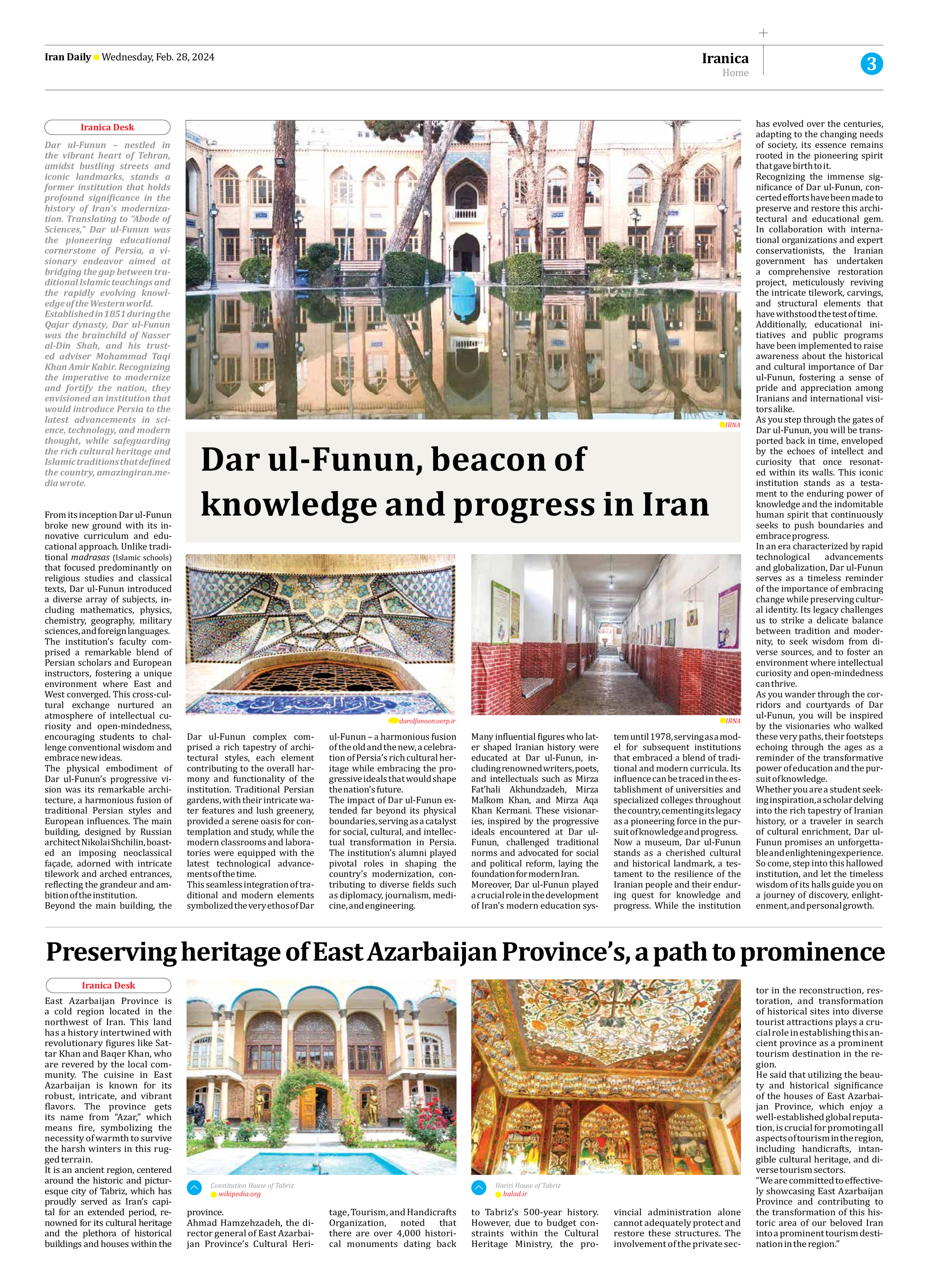
Dar ul-Funun, beacon of knowledge and progress in Iran
Dar ul-Funun – nestled in the vibrant heart of Tehran, amidst bustling streets and iconic landmarks, stands a former institution that holds profound significance in the history of Iran’s modernization. Translating to “Abode of Sciences,” Dar ul-Funun was the pioneering educational cornerstone of Persia, a visionary endeavor aimed at bridging the gap between traditional Islamic teachings and the rapidly evolving knowledge of the Western world.
Established in 1851 during the Qajar dynasty, Dar ul-Funun was the brainchild of Nasser al-Din Shah, and his trusted adviser Mohammad Taqi Khan Amir Kabir. Recognizing the imperative to modernize and fortify the nation, they envisioned an institution that would introduce Persia to the latest advancements in science, technology, and modern thought, while safeguarding the rich cultural heritage and Islamic traditions that defined the country, amazingiran.media wrote.
From its inception Dar ul-Funun broke new ground with its innovative curriculum and educational approach. Unlike traditional madrasas (Islamic schools) that focused predominantly on religious studies and classical texts, Dar ul-Funun introduced a diverse array of subjects, including mathematics, physics, chemistry, geography, military sciences, and foreign languages.
The institution’s faculty comprised a remarkable blend of Persian scholars and European instructors, fostering a unique environment where East and West converged. This cross-cultural exchange nurtured an atmosphere of intellectual curiosity and open-mindedness, encouraging students to challenge conventional wisdom and embrace new ideas.
The physical embodiment of Dar ul-Funun’s progressive vision was its remarkable architecture, a harmonious fusion of traditional Persian styles and European influences. The main building, designed by Russian architect Nikolai Shchilin, boasted an imposing neoclassical façade, adorned with intricate tilework and arched entrances, reflecting the grandeur and ambition of the institution.
Beyond the main building, the Dar ul-Funun complex comprised a rich tapestry of architectural styles, each element contributing to the overall harmony and functionality of the institution. Traditional Persian gardens, with their intricate water features and lush greenery, provided a serene oasis for contemplation and study, while the modern classrooms and laboratories were equipped with the latest technological advancements of the time.
This seamless integration of traditional and modern elements symbolized the very ethos of Dar ul-Funun – a harmonious fusion of the old and the new, a celebration of Persia’s rich cultural heritage while embracing the progressive ideals that would shape the nation’s future.
The impact of Dar ul-Funun extended far beyond its physical boundaries, serving as a catalyst for social, cultural, and intellectual transformation in Persia. The institution’s alumni played pivotal roles in shaping the country’s modernization, contributing to diverse fields such as diplomacy, journalism, medicine, and engineering.
Many influential figures who later shaped Iranian history were educated at Dar ul-Funun, including renowned writers, poets, and intellectuals such as Mirza Fat’hali Akhundzadeh, Mirza Malkom Khan, and Mirza Aqa Khan Kermani. These visionaries, inspired by the progressive ideals encountered at Dar ul-Funun, challenged traditional norms and advocated for social and political reform, laying the foundation for modern Iran.
Moreover, Dar ul-Funun played a crucial role in the development of Iran’s modern education system until 1978, serving as a model for subsequent institutions that embraced a blend of traditional and modern curricula. Its influence can be traced in the establishment of universities and specialized colleges throughout the country, cementing its legacy as a pioneering force in the pursuit of knowledge and progress.
Now a museum, Dar ul-Funun stands as a cherished cultural and historical landmark, a testament to the resilience of the Iranian people and their enduring quest for knowledge and progress. While the institution has evolved over the centuries, adapting to the changing needs of society, its essence remains rooted in the pioneering spirit that gave birth to it.
Recognizing the immense significance of Dar ul-Funun, concerted efforts have been made to preserve and restore this architectural and educational gem. In collaboration with international organizations and expert conservationists, the Iranian government has undertaken a comprehensive restoration project, meticulously reviving the intricate tilework, carvings, and structural elements that have withstood the test of time.
Additionally, educational initiatives and public programs have been implemented to raise awareness about the historical and cultural importance of Dar ul-Funun, fostering a sense of pride and appreciation among Iranians and international visitors alike.
As you step through the gates of Dar ul-Funun, you will be transported back in time, enveloped by the echoes of intellect and curiosity that once resonated within its walls. This iconic institution stands as a testament to the enduring power of knowledge and the indomitable human spirit that continuously seeks to push boundaries and embrace progress.
In an era characterized by rapid technological advancements and globalization, Dar ul-Funun serves as a timeless reminder of the importance of embracing change while preserving cultural identity. Its legacy challenges us to strike a delicate balance between tradition and modernity, to seek wisdom from diverse sources, and to foster an environment where intellectual curiosity and open-mindedness can thrive.
As you wander through the corridors and courtyards of Dar ul-Funun, you will be inspired by the visionaries who walked these very paths, their footsteps echoing through the ages as a reminder of the transformative power of education and the pursuit of knowledge.
Whether you are a student seeking inspiration, a scholar delving into the rich tapestry of Iranian history, or a traveler in search of cultural enrichment, Dar ul-Funun promises an unforgettable and enlightening experience. So come, step into this hallowed institution, and let the timeless wisdom of its halls guide you on a journey of discovery, enlightenment, and personal growth.







